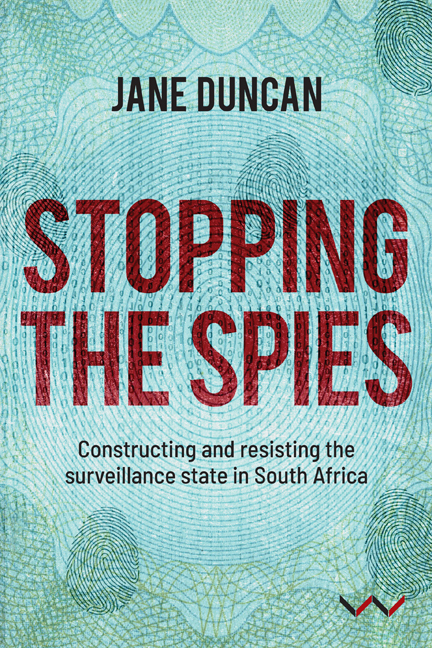Book contents
- Frontmatter
- Contents
- Acknowledgements
- List of Figures and Tables
- List of Acronyms
- Preface
- Introduction
- Chapter 1 Theorising the surveillance state
- Chapter 2 Is privacy dead? Resistance to surveillance after the Snowden disclosures
- Chapter 3 The context of surveillance and social control in South Africa
- Chapter 4 Lawful interception in South Africa
- Chapter 5 State mass surveillance, tactical surveillance and hacking in South Africa
- Chapter 6 Privacy, surveillance and public spaces in South Africa
- Chapter 7 Privacy, surveillance and population management: the turn to biometrics
- Chapter 8 Stopping the spies: resisting unaccountable surveillance in South Africa
- Chapter 9 Conclusion
- Notes
- Select Bibliography
- Index
Preface
Published online by Cambridge University Press: 17 May 2019
- Frontmatter
- Contents
- Acknowledgements
- List of Figures and Tables
- List of Acronyms
- Preface
- Introduction
- Chapter 1 Theorising the surveillance state
- Chapter 2 Is privacy dead? Resistance to surveillance after the Snowden disclosures
- Chapter 3 The context of surveillance and social control in South Africa
- Chapter 4 Lawful interception in South Africa
- Chapter 5 State mass surveillance, tactical surveillance and hacking in South Africa
- Chapter 6 Privacy, surveillance and public spaces in South Africa
- Chapter 7 Privacy, surveillance and population management: the turn to biometrics
- Chapter 8 Stopping the spies: resisting unaccountable surveillance in South Africa
- Chapter 9 Conclusion
- Notes
- Select Bibliography
- Index
Summary
In 2013, the former National Security Agency (NSA) contractor Edward Snowden leaked secret documents revealing that various state spy agencies, notably the NSA and the UK Government Communications Headquarters (GCHQ) and other allied intelligence agencies, had spied on the communications of millions of innocent citizens. Many were outraged that their privacy was being violated, and rightly so. They objected to the fact that these governments had used the war against terror – launched in the wake of the 11 September 2001 attacks on the United States and the 2005 attack on London – as a pretext to expand state surveillance capacities far beyond what was actually needed to fight this war. The spy agencies scooped up the communications of millions of people into their dragnet, including those of lawyers, journalists and academics, who are under professional obligations to protect their sources of information. But the Snowden revelations revealed only the tip of the surveillance iceberg; apart from insisting on their right to tap into communications, more and more governments introduced surveillance technologies to track people's movements and transactions with public and private institutions (such as banks). As a result, the state is becoming like a one-way mirror, where it can see more and more of what its citizens do and say, while citizens see less and less of what the state does, owing to high levels of secrecy around surveillance.
In this book, I assess the relevance of Snowden's revelations for South Africa, and in doing so, I ask to what extent South Africa is becoming a surveillance society governed by a surveillance state. How concerned should we be about the ever-expanding surveillance capacities of the state, and the uses to which they are being put? Are they being used for the democratic purpose of making people safer, or for the repressive purpose of social control, to pacify citizens and to target those considered to be politically threatening to ruling interests? What forms of collective action are needed to ensure that unaccountable surveillance does not take place, as the secretive nature of these activities makes them very difficult to organise around. What works and what doesn't when it comes to developing organised responses?
- Type
- Chapter
- Information
- Stopping the SpiesConstructing and resisting the surveillance state in South Africa, pp. xvii - xxPublisher: Wits University PressPrint publication year: 2018

